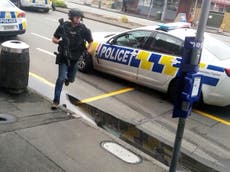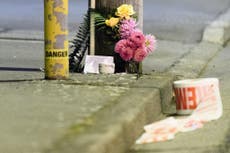Fraser Anning's attempt to blame Muslim victims of the New Zealand terror attack is all too familiar
I saw at first-hand the blind spot to anti-Muslim hate and Islamophobia during my six years with Tell Mama
The grief had hardly set in for the families and loved ones of those murdered in Friday’s terror attack on two mosques in Christchurch, New Zealand, before Fraser Anning, the senator for Queensland, said: “The real cause of bloodshed on New Zealand streets today is the immigration programme which allowed Muslim fanatics to migrate to New Zealand in the first place.”
Just to rub salt in the wound, he added: “Let us be clear, whilst Muslims may have been the victims today, usually they are the perpetrators. Worldwide, Muslims are killing people in the name of their faith on an industrial scale.”
This is a common pattern, where attacks against Muslims are justified by some politicians in the name of tackling Islamist extremism or terrorism.
If you read that very statement, the victim-blaming that was taking place was against innocent, law-abiding Muslims who were simply praying and who had no history of Islamist violence.
It was a crass and cruel attempt to load onto the dead souls a sense of guilt that was unmerited and uncalled for.
As the founder of Tell Mama, the national support service for people targeted by anti-Muslim hate, which also maps and monitors incidents in the UK, I saw this time and time again when I led the project between 2011 and 2016. There were three forms of insidious victim-blaming that took place when Muslims were targeted.
The first element in the blame game was from politicians like Senator Anning who in effect said “they [Muslims] had it coming” because of the actions of their co-religionists.
The second element was denial of the extent and level of the problem. This would take the form of “Islamophobia is an issue, but it is a few harsh words said to people with thin skins”. Or it translated into “the problem involves some harsh words said online”, thereby reducing it to a minor ailment, like stubbing your toe on the floor. It was simply brushed away.
The final element was the notion that Muslims, born and brought up in the UK, should just keep quiet and be thankful for living in this country. This was topped-and-tailed with the view that they should put up with anything since they were “allowed in”. These are the three main thrusts of victim-blaming that swill around social circles time and time again. And they exist to this day.
Such has been the blind spot to anti-Muslim hate and Islamophobia that during my six years with Tell Mama I constantly had to work to get civil servants even to move on issues tackling such discrimination.
There was little stomach to understand or take on the problem. The result of this was a haphazard and deeply vacuous approach by government to ensure that far-right networks were disrupted, broken up and ultimately fragmented. We have managed to do this to a large degree with Islamist extremism, though there was a blind spot over far-right extremism that remained in place for more than five years during my tenure in Tell Mama.
This is further underscored by the lack of publicity and introspection around the lives lost due to anti-Muslim hate. Since 2013, three British Muslims have lost their lives to far-right extremists: Mushin Ahmed, Muhammad Saleem and Makram Ali. All of them were senior citizens walking our streets; what killed them was the virulent tide of anti-Muslim hate and far-right extremism that has swept the UK.
Three grandfathers murdered within five years in the UK, yet the public seems to have little knowledge of the deadly nature of anti-Muslim hate (moreover, polling by Hope not Hate reveals that a staggering third of the public believe there are Muslim-run “no go” zones in Britain).
When we look at the comments of Senator Anning, we have to see within the heart of them a bigotry that is based on a perverse stereotyping of Muslims.
I have fought tooth and nail against Islamist groups and extremism; I have seen the damage that they have done to British Muslim communities. Islamist extremists make up a tiny minority of this hard-working and law-abiding faith community. You can detach Islamism from Muslims, yet the senator paints a broad brush image, as though all Muslims must carry the sins of their co-religionists who are involved in terrorism.
What Anning also fails to mention is that one of the largest groups of victims of Islamist terrorism are Muslims themselves.
It is a slap in the face to Muslims who over the last six years have died in their hundreds of thousands fighting against groups such as Isis and al-Qaeda. Senator Anning creates a world view that is based on a “them and us” approach.
The very freedoms that Senator Anning enjoys in Australia have also been built on the backs of Muslim soldiers in India during the Second World War, who fought to harry the Japanese and to weaken their determined assault across the Pacific. Maybe next time he opens his mouth, someone should remind him of that.
Fiyaz Mughal is director of Faith Matters and founder of Tell Mama



